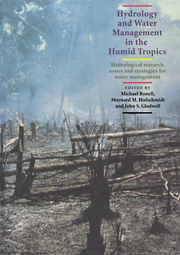 Hydrology and Water Management in the Humid Tropics
Hydrology and Water Management in the Humid Tropics Book contents
- Frontmatter
- Contents
- List of Authors
- Foreword by Federico Mayor, Director-General, UNESCO
- Preface
- Cartographic Credit
- Acknowledgements
- SECTION I INTRODUCTION
- SECTION II HUMID TROPICS SETTING
- SECTION III REGIONAL HYDROLOGY
- SECTION IV PHYSICAL PROCESSES
- SECTION V PHYSICAL PROCESSES – HUMAN USES: THE INTERFACE
- SECTION VI MANAGEMENT ISSUES
- SECTION VII APPENDICES
- Place index
Foreword by Federico Mayor, Director-General, UNESCO
Published online by Cambridge University Press: 23 December 2009
- Frontmatter
- Contents
- List of Authors
- Foreword by Federico Mayor, Director-General, UNESCO
- Preface
- Cartographic Credit
- Acknowledgements
- SECTION I INTRODUCTION
- SECTION II HUMID TROPICS SETTING
- SECTION III REGIONAL HYDROLOGY
- SECTION IV PHYSICAL PROCESSES
- SECTION V PHYSICAL PROCESSES – HUMAN USES: THE INTERFACE
- SECTION VI MANAGEMENT ISSUES
- SECTION VII APPENDICES
- Place index
Summary
It is widely recognized that water is going to be one of the major issues confronting humanity at the turn of the century and beyond. We are already facing a crisis as regards the quantity and quality of water supply, but we have yet to experience the full social and political impact of that crisis. Water is the life-blood of living organisms, and a very potent factor in human behaviour. Where plentiful, water is accepted unreflectively as a gift of nature. But when scarcity makes it a precious commodity, it can become a source of dispute and even conflict between its users. We know that civilization has always been crucially dependent on water. It is essential to remember that the converse is also true: vital water resources depend upon civilization, or more precisely on the “civilized” use of a finite and vulnerable resource. Culture and tradition are therefore important dimensions to be taken into account in water conservation.
The interdependence of water and civilization highlights the need for close co-operation among all players in the water game, extending from the local through the regional right up to the global level. At the international level, one of the most important needs is for co-ordinated efforts to understand the processes occurring in the water cycle, to assess surface and ground water resources, and to promote attitudes conducive to maintaining the quality and quantity of water resources for generations to come. Recognition of the importance of these objectives led to the launching of the International Hydrological Decade (IHD) in 1964, the first truly international scientific and educational effort ever made in hydrology.
- Type
- Chapter
- Information
- Hydrology and Water Management in the Humid TropicsHydrological Research Issues and Strategies for Water Management, pp. xv - xviPublisher: Cambridge University PressPrint publication year: 1993
